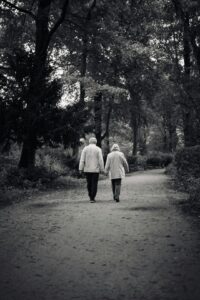It would be an ending; and it would be a beginning: the day that Ann finally entered Memory Care after years of knowing it would happen. That day would begin another—and likely the final—chapter of our lives together, apart.
The day was Thursday, May 15, 2025.
That we would reach this destination was known with certainty when we got the Alzheimers diagnosis in June, 2021. Now we see that once far-off destination on last week’s calendar, already receding towards the vanishing point in the rear view mirror.
While it is awkward and unfamiliar territory, this post is mostly about my needs, having fulfilled my promise to place Ann in the best possible care. Even if I leave the scene tomorrow, she is safely home. That work is done.
This turning point ends the perpetual need for my energy, attention, patience and endurance; for my assistance and re-direction. This vigilance, especially in the past few years has bee such that I could no longer sustain my own health and also hers.
As I’ve told her many times: “I’ll never stop caring ABOUT you, but I can no longer care FOR you. I’ll have to trust others to meet your needs; to provide the best possible life experience in a simpler, more predictable environment.”
WE ARE WHERE WE’VE BEEN GOING
This reason and purpose has guided our lives since the diagnosis. Memory care is a fate she has only acknowledged for the past month. I’ve struggled and staggered under the weight of it for years.
I will be living alone, so it’s time to consider what path my own life will take, with vastly more choice and personal intention. I am not unaware of the hardships which are already beginning to appear. No rose gardens expected.
This is a pyrrhic victory, but with gratitude, there’s still something left of me to move ahead with hope. Early in this metamorphosis, Ann is adapting better than anticipated. More about that, perhaps, in a future post.

I’ll outline the pros and cons of life under two roofs, under two very different regimes of need and control. It will be a partial list only.
This focus on ME makes me uneasy, but I need to say it and see it and gauge the old ways of being against the possible new ways ahead.
Maybe this reflection helps other care partners in my situation see their future more positively. There’s hope, even after dementia has sucked the oxygen out of your life before Memory Care.
You still have a life of possibility if you choose it, and then work to make it happen. Yes, it would be easier to retreat, become a hermit, and binge-watch and eat junk food. Don’t do it. I’m talking to me.
In the transition from WE to ME, my life and health will change. Much will be gained, even as much has been lost.
FINDING A NEW NORMAL: THE LIST
📕 HEADROOM: I can think complete thoughts anytime (if they come), not just in my two hours between midnight and dawn. I can dictate to write (as I have for this post). I can walk and make audio notes, and end my walk feeling relaxed rather than stressed by the thoughts I would have pursued if I hadn’t been focused on her needs.
📕 PARTICIPATION: I will climb out of the social isolation we fell into because it took too much energy to get there, be there, and explain to her where we had been and why. I’ll seek opportunities to join and participate in Audubon activities, historical society and conservation federation activities, and to be the new old guy on the pickleball court and maybe at a church somewhere.
📕 EXERCISE: I’ll walk when and where I want, at my own pace. She became uneasy when she didn’t know where we were, and she mostly did not know where we were. She couldn’t walk fast enough to raise my heart rate over 100. I’ll use the gym on my schedule, and maybe the saltwater pool down the hall. And play pickleball?
📕 REST: I’ll nap for rest and recovery, not for temporary oblivion and avoidance of of waking overwhelm.
📕 PUNCTUALITY: I’ll be on time. I’ll leave when necessary, and get to my destination without needing a belt for her (or a clothes pin) to hold her pants up as we enter the hallway and go back inside, for modesty’s sake. Or for more tissue; or one more bathroom stop. Always something. Always late.
📕 ORGANIZATION: I won’t find the peanut butter in the fridge (if I could find it at all), and plates will go with plates. The where of things will be predictable and finding lost things won’t be required multiple times daily. Now lost things are on me.
📕 NEW NORMAL: I won’t find cereal boxes oddly sealed each day with tape. I may leave two dirty plates in the sink for an hour, if I choose. Our household routine has been determined by her notions of how things must be, even if they made no sense to me. I’ve conformed to her normal; now my idiosyncrasies will dictate what is “normal” which many times for her has meant “the way my mother always did it.”
📕 DIET: I’ll eat when and what I want and no more than I want. She needed to gain weight so we mustn’t miss a meal or eat lightly. I don’t need to gain weight, and I won’t always bring home dessert, hoping to have the will power to not eat it; but I almost always did.
📕 ENTERTAINMENT: She disliked sitting in front of a screen. The noise and motion made her uneasy. Now, I’ll watch what I choose, when I choose, and not explain who those characters are in the fifth season of something we’ve watched for months. I won’t explain what’s happening, and then explain it again minutes later. I won’t explain what I’m laughing at, which has sucked the life out of witty dialogue.
📕 SLEEP: I’ll sleep in the bed all night long. No more curling up in fetal position on the loveseat at midnight to avoid snoring or sorting of drawers in the dark or fumbling about in the kitchen. Nocturnal mumbling will not disturb my sleep. Non-restorative sleep has been the killer ingredient of the final months, taking its toll on both of us, but mostly on me. I hope she’ll sleep soundly, eventually, without me, after 55 years.
📕 PRIVACY: I will receive calls from friends and talk openly in my own living space without her by my side, even when I step out of the room in my socks for a private call. There has been nothing private in my life for years. Near the end, she could not be alone for 15 minutes. I have been smothered and suffocated, but could not tell her that.
📕 SCHEDULES: The most surreal change after her first overnight stay down the hall was cancelling all her alarms on my phone. DELETE: Evening meds, morning meds, eye drops, shower, exercise, beauty shop. I no longer have to be frustrated to discover that she never took her meds, even though she stood there looking at them for ten minutes.

AND LIFE GOES ON
Meanwhile, Ann will need consistent nutritional health, exercise, entertainment, organization, sleep, and social connection.
I entrust these responsibilities to others, as I’ve been told it is important to put my mask on first. Now that I can grow healthy again, we’ll realize this hard choice benefits us both. I’ll stay in our independent living apartment, a five-minute walk from Ann’s new home.
This has been a bitter victory, but I’m ready and hopefully soon able to take back the helm and steer the leaky lifeboat of MY life somewhere worth going. I’ll see her often, and hopefully find her content and at peace in a new way, in a simpler, less bewildering neighborhood.
I might return to write objectively about our journey from this other side of things, to share insights I’ve had as care partner, before and after Memory Care. Sadly, I rarely talk with anyone not impacted by dementia in their circle of family and friends.
Will the world be different when today’s CHILDREN face their own diagnosis of progressive dementia? Can we find a way to diagnose early AND intervene successfully to spare others what I know they will come up against?
 – Fred First is an author, naturalist, photographer watching Nature under siege since the first Earth Day. Cautiously hopeful. Writing to think it through. Thanks for joining me. Subscribe to My Substack HERE
– Fred First is an author, naturalist, photographer watching Nature under siege since the first Earth Day. Cautiously hopeful. Writing to think it through. Thanks for joining me. Subscribe to My Substack HERE

